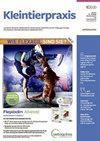眼镜蛇——ivef的共识摘要——“建议患有癫痫症的狗的诊断方法”
IF 0.1
4区 农林科学
Q4 VETERINARY SCIENCES
引用次数: 0
摘要
2015年,国际兽医癫痫工作组(IVETF)发布了“共识建议:犬癫痫诊断方法”,提出了癫痫发作患者诊断程序标准化方法的基础。推荐的手术方法包括两个基本步骤,以澄清患者是否真的患有癫痫,并确定其根本原因。作者建议采用三个置信水平的分级系统来描述“特发性癫痫”诊断的可靠性。共识提案的作者强调,这些建议将随着犬癫痫的神经影像学、脑电图和分子遗传学的进展而不断发展。本文以德文概述协商一致建议的内容。本文章由计算机程序翻译,如有差异,请以英文原文为准。
Epilepsie aktuell – Zusammenfassung des Konsenspapiers des IVETF „Vorschlag für die diagnostische Herangehensweise bei Hunden mit Epilepsie“
In 2015, the International Veterinary Epilepsy Task Force (IVETF) published the "Consensus Proposal: Diagnostic Approach to Epilepsy in Dogs", proposing the basis for a standardized method of diagnostic procedures in patients suffering from seizures. The recommended modus operandi comprises two fundamental steps to clarify if the patient is truly suffering from epilepsy and to determine its underlying cause. The authors suggest a tier system of three confidence levels describing the reliability of the diagnosis "idiopathic epilepsy" The authors of the consensus proposal emphasize that these recommendations will evolve over time with advances in neuroimaging, electroencephalography, and molecular genetics of canine epilepsy. In this article, the contents of the consensus proposal are summarized in German language.
求助全文
通过发布文献求助,成功后即可免费获取论文全文。
去求助
来源期刊

Kleintierpraxis
农林科学-兽医学
CiteScore
0.10
自引率
0.00%
发文量
0
审稿时长
18-36 weeks
期刊介绍:
Information not localized
 求助内容:
求助内容: 应助结果提醒方式:
应助结果提醒方式:


